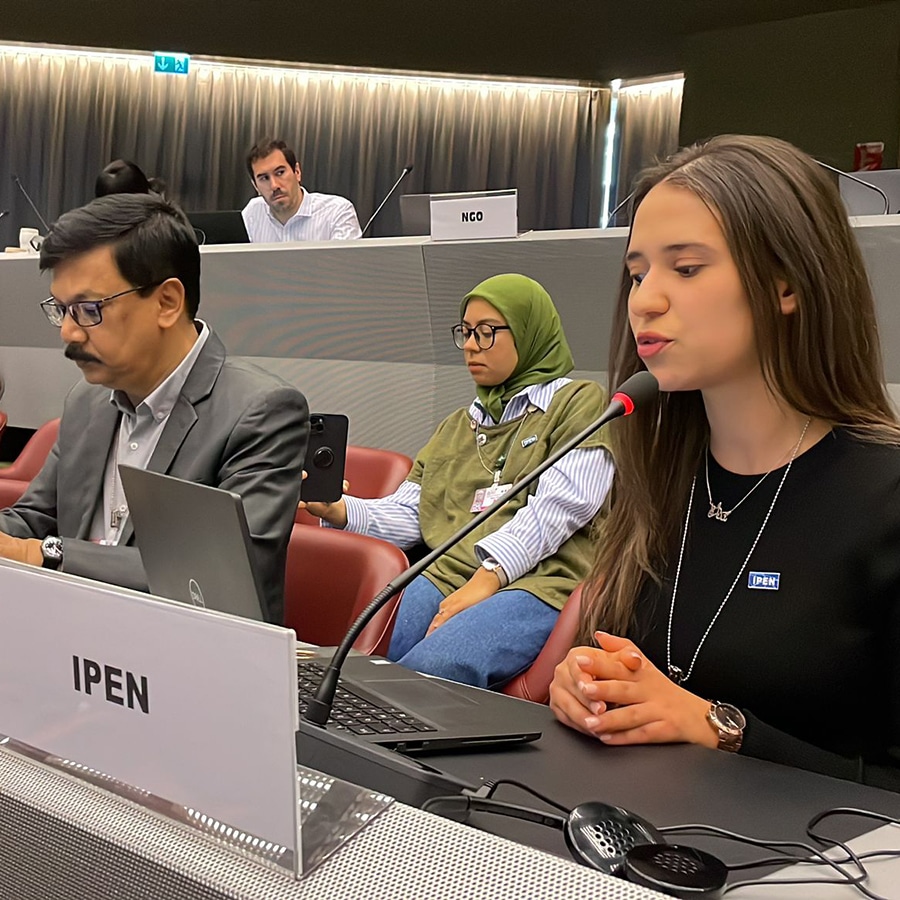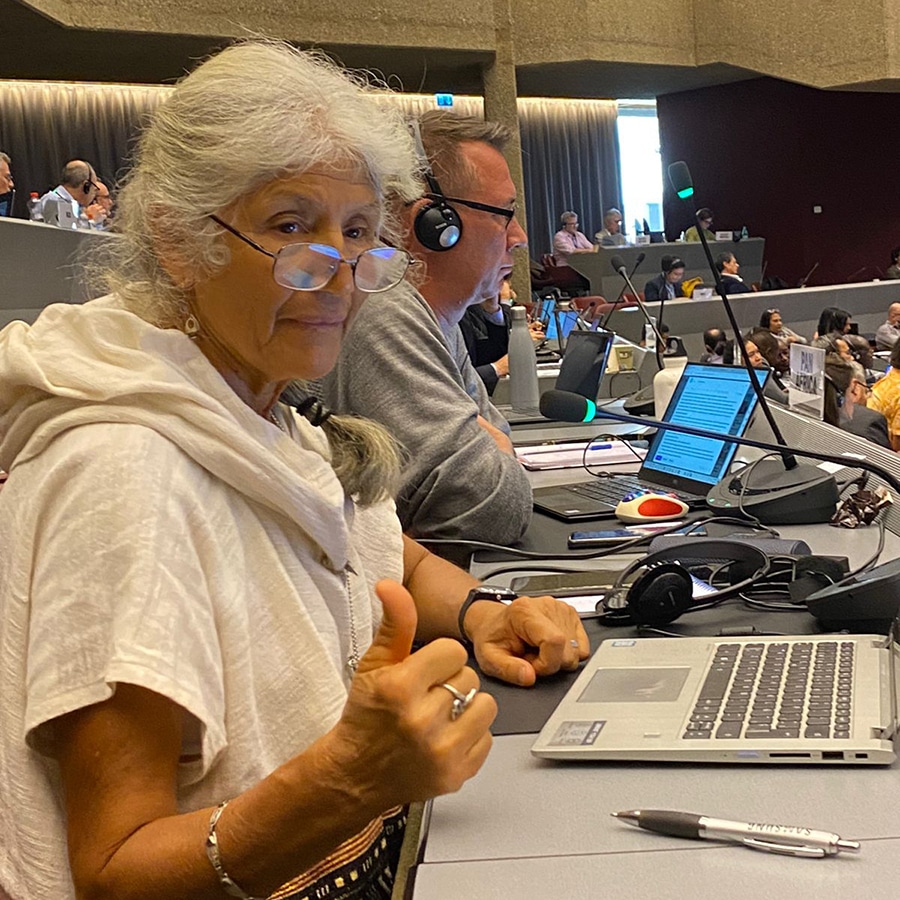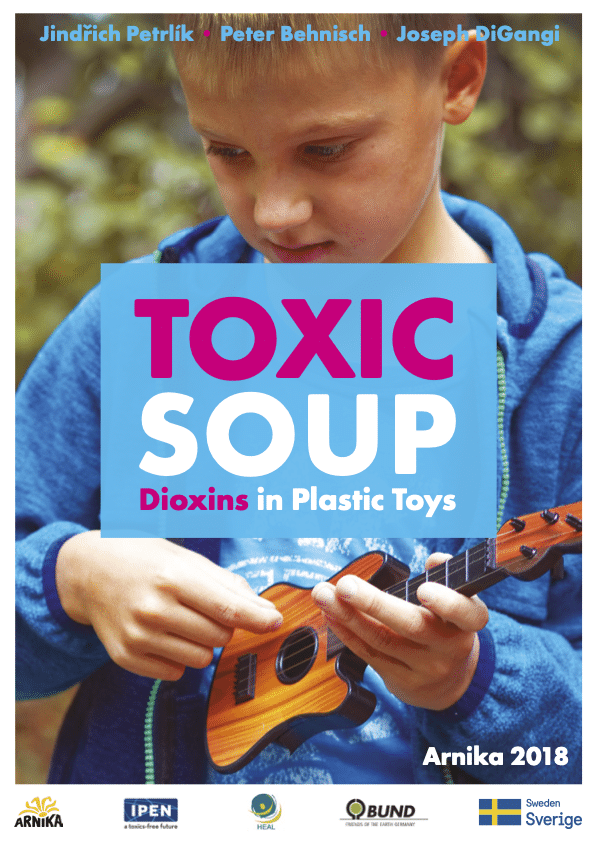"A legally binding instrument on plastic pollution..."
In March 2022, the United Nations Environment Assembly (UNEA) approved a broad mandate to start talks on an international treaty to address the growing threats from plastic pollution.
The Plastics Treaty will be a key legally binding agreement moving the world toward a toxics-free future.
Plastics Treaty Resources
The Plastics Treaty negotiations are scheduled to continue through 2024, with regular sessions of the Intergovernmental Negotiating Committee (INC).
For each negotiating session, IPEN develops policy documents on the meeting agenda and emerging issues, as well as briefing papers, reports, and other materials.
Addressing the Plastic Pollution Crisis
In March 2022, in recognition of the plastics crisis, 175 countries at the UN Environment Assembly agreed to begin negotiations toward a global Plastics Treaty. IPEN contributed to the UNEA discussions and remains deeply engaged in the Plastics Treaty process, supporting participation from our global network members to ensure that voices are heard from countries that experience the greatest health and environmental threats from chemicals in plastics.
The initial development of the Treaty centered primarily on visible plastics pollution – the common scenes of plastic litter in the oceans or marine animals injured by plastics. But IPEN calls for a Plastics Treaty that goes beyond visible plastics pollution, advocating for a Treaty founded on an understanding of the threats that chemicals in plastics pose to our health and environmental rights.
IPEN calls for a Plastics Treaty that aims to eliminate the toxic impacts of plastics throughout their life cycle.
Plastics Treaty Principles
Understanding plastics as carbon and chemicals
Plastics are made from fossil fuels (oil and gas) with a mix of chemicals. To solve the plastics problem, we must address all plastics (not merely single-use plastics or plastic litter) and put the responsibility for reducing production on the source of the problem, the fossil fuel industry, not on consumers.
Addressing the harmful health effects from chemicals in plastics
Chemicals in plastics have been linked to cancer, brain damage, infertility, and other serious conditions. When plastics poison our bodies and pollute our communities, we lose the opportunity to live healthy, productive lives.
Toxic chemicals make plastics incompatible with a circular economy
The toxic chemicals in plastics make them inherently incompatible with toxics-free, circular economic approaches. We need immediate steps to significantly reduce the production of plastics and a fundamental shift in our materials economy to promote safer, sustainable materials.
IPEN science, data, and policy analyses on plastics


Open Participation
Because the chemical threats from plastics fall unequally on low- and middle-income countries, the Plastics Treaty process must guarantee and promote wide, inclusive, and transparent public participation, including ensuring financial support for equal participation. The Treaty must tackle the problem of plastic pollution at its source, and it must include the expertise of those most harmed by and familiar with those sources.
Other international negotiation processes and agreements, such as the Aarhus Convention and the Escazu Agreement, have set significant progress for defining and modeling public participation and environmental democracy.
Those on the frontlines of the worst environmental and human rights impacts from plastics need to be in the room and at the table, as active participants throughout the negotiation process. Their unique perspectives, expertise, local knowledge, innovations, and insights must be heard and accounted for during this historic treaty for our health and the planet.
Health and Environment
The objective of the Plastics Treaty should be the protection of human health and the environment based on the precautionary principle. This principle is included in many international agreements and states that where there is a threat of significant harm to health or the environment, lack of full scientific certainty should not be used as a reason for postponing measures to avoid or minimize the threat.
The impacts of plastics on our health and environmental rights are well documented. Plastics pollution has been widely seen as a waste problem, resulting in “solutions” focused on waste management and consumer behavior. More importantly, a Plastics Treaty must address ending exposures to toxic chemicals from plastics, to protect human health. Plastic products are so ubiquitous in our daily lives that contamination from chemicals in plastics is found in our food, air, water, and ultimately our bodies. As noted in a recent study, the production of chemicals and plastics has exceeded the safe operating space for humanity.
A Plastics Treaty that provides for global control of the health impacts of the chemical ingredients used in plastics is necessary because plastics cross borders in many uncontrolled ways throughout their lifecycle.
We need real solutions to the global plastics crisis because the toxic legacy of plastics will not only affect those living today but future generations to come.
Plastics, Chemicals, and Climate Change
Plastic production and the decomposition of plastic materials in the environment both contribute to climate change. Plastic production is expected to increase by 400% by 2050 with the chemical additives market similarly expanding. Over the next few decades, the fossil fuels industry – a major driver of climate change – is planning to fill the decreasing transportation markets for fossil fuels (as electric car sales rise and electrification increases in the transportation sector) with increased markets for plastics. By 2050, petrochemical production founded largely on increasing plastics production is expected to drive a 50% increase in oil demand globally.
In addition, burning, incineration, and chemical recycling of plastics all create carbon emissions that contribute to climate change. IPEN calls for a Plastics Treaty that addresses climate threats from plastics throughout their lifecycle and eliminates toxic and climate pollutants.
Plastic Waste, Waste Exports, and Recycling
Plastics poison the Circular Economy
A Plastics Treaty should address the unequal trade in plastic wastes and the harms resulting from this trade to low- and middle-income counties by promoting an end to the export of plastic wastes and supporting environmental justice and human rights.
A circular economy aims to change the economic “take-make-waste” approach. Instead, a circular approach looks to minimize the extraction of natural resources and waste creation, designing products for sustainability and favoring products that maximize an item’s lifespan, are easier to use, recycle, and repair, and that incorporate more recycled materials and limit single-use. Since many toxic chemicals are used in plastics, plastics are inherently incompatible with a circular economy.
A Plastics Treaty should reject a toxic circular economy and should include restrictions to prevent the recycling and reuse of plastic materials that contain hazardous chemicals. So-called “advanced” and chemical recycling schemes that create toxic wastes and result in toxic recycled plastic products are not safe for health or the environment and should not be included in a Treaty as acceptable technologies for plastic waste disposal. The Treaty should also exclude incineration, co-firing in coal-fired power plants and other waste-to-energy processes, and co-processing in cement kilns, and promote safer, non-combustion technologies. A Treaty should promote a transition to a non-toxic materials economy that is just and inclusive to workers across the plastics supply chain and lifecycle, to provide opportunities for decent work in conditions of equity, security, and human dignity.
Transparency, Sustainability, and Financing
To ensure countries have information they need to manage plastics and plastic waste, a Plastics Treaty should require reporting and transparency on the types and amounts of plastics produced, imported, and exported, as well as plastic waste generation, collection, and end-of-life management. Transparency on the chemicals used in plastics production and as plastic ingredients should be publicly available and communicated throughout the supply chain.
A Plastics Treaty should also promote designing plastics according to sustainability criteria that are compatible with a non-toxic circular economy, resource efficiency, and a low carbon economy. A scientific body should be established to review the sustainability criteria and add or remove chemicals and polymers of concern to ensure the Treaty is updated with current scientific knowledge.
Financing and “Producer Pays”
Throughout the process for developing the Plastics Treaty and within the Treaty terms there must be additional, sustainable, and adequate funding for development and implementation of the Treaty. The “polluter pays” principle requires that the industries that benefit from plastics bear the costs of all impacts on human health, society, and the environment caused by the production, use, dumping, import and export of plastics.
Thus, the Plastics Treaty should require that chemical and petrochemical industries contribute to financing the prevention and remediation of the pollution their materials cause. Funds can be recovered through policies such as extended producers’ responsibility.
Such funding is essential to ensure open, transparent, and inclusive participation for civil society, as well as provide resources to ensure broad, gender and regionally balanced public participation, particularly from low- and middle-income countries. This will allow public interest organizations to work together with governments to ensure a cooperative multi-stakeholder approach in the implementation and further development of the Treaty. Funding is also vital for providing resources for capacity building and technology transfer to low- and middle-income governments and civil society.
Global Policy Connections
The Plastics Treaty is needed to regulate areas in the life cycle of plastics that are not covered by other international bodies and that are critical to prevent the harmful health and environmental impacts of plastics and their chemical ingredients.
A Plastics Treaty that aims to eliminate negative impacts of plastics throughout their life cycle would also help achieve the environmental and health objectives of other agreements. IPEN has contributed to all the major global policy agreements noted here, in most cases from their inception. IPEN was founded in 1998 at the outset of talks toward developing the Stockholm Convention, to ensure that voices from the Global South, areas most affected by toxic pollution, would be heard throughout the negotiations. By supporting our global network’s participation in these international policy forums and the Plastics Treaty negotiations, we continue to play this vital role.
The major international agreements related to the Plastics Treaty include:

The Stockholm Convention
A global treaty to protect human health and the environment from the effects of persistent organic pollutants (POPs). While POPs in plastics may be covered by the Stockholm Convention, thousands of toxic chemicals in plastics are not considered POPs and need to be regulated in other agreements, such as a Plastics Treaty.
The Basel Convention
Aims to protect human health and the environment from the adverse effects of hazardous and other wastes. However, it does not cover the design of plastics (or other materials) to prevent toxic waste production. Additionally, its scope does not include all plastics and it does not cover chemicals of concern used in plastics.
The Rotterdam Convention
Aims to protect human health and the environment by requiring open information about trade in toxic chemicals and consent from importing countries before the chemicals can be exported. Some of the chemicals identified under the Convention and many banned or severely restricted chemicals are used in plastics.
The Strategic Approach to International Chemicals Management (SAICM)
A voluntary policy framework to promote chemical safety around the world. Many of the priority issues within the SAICM process are relevant to plastics, such as chemicals in products, chemicals in electronics, and endocrine disrupting chemicals.











